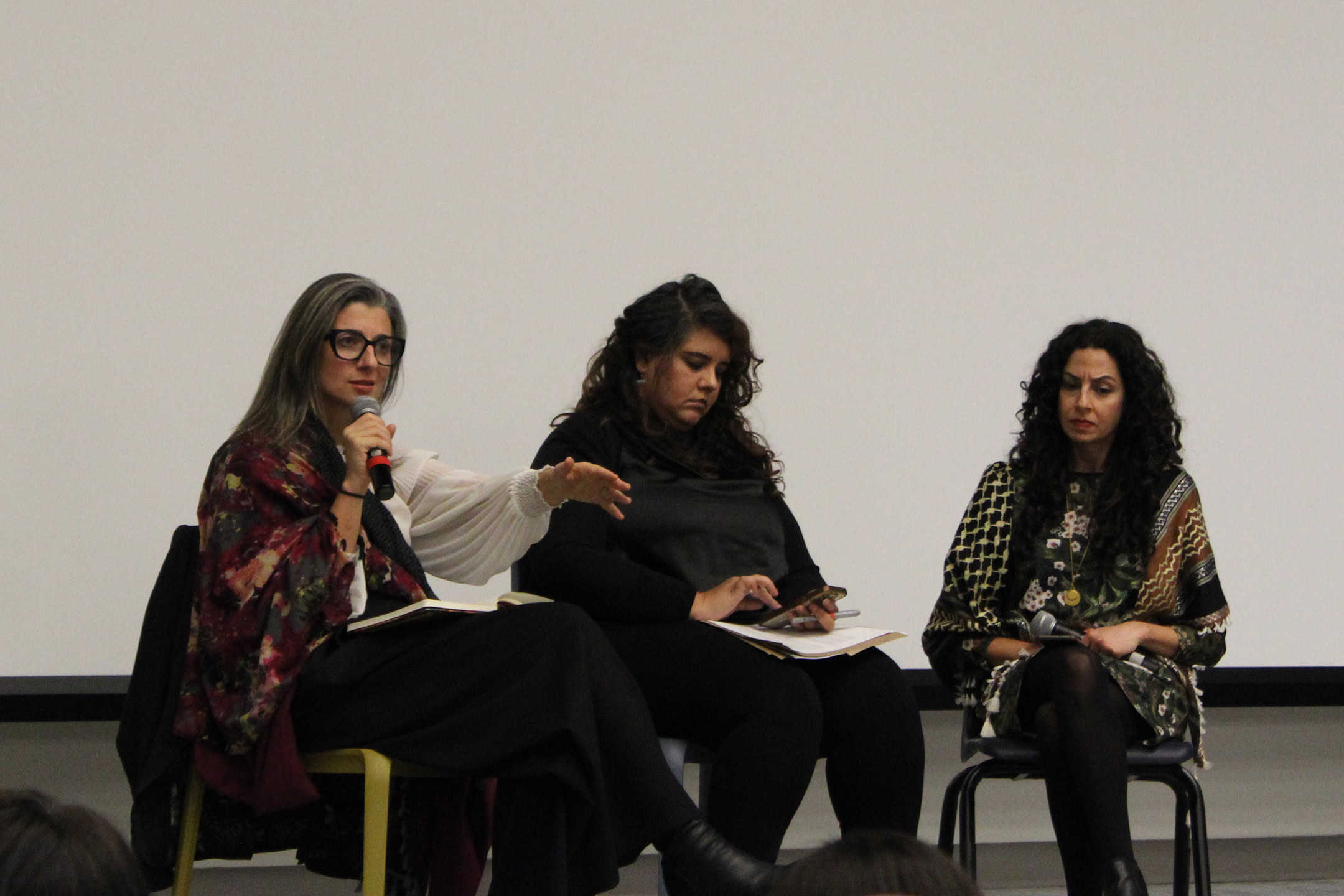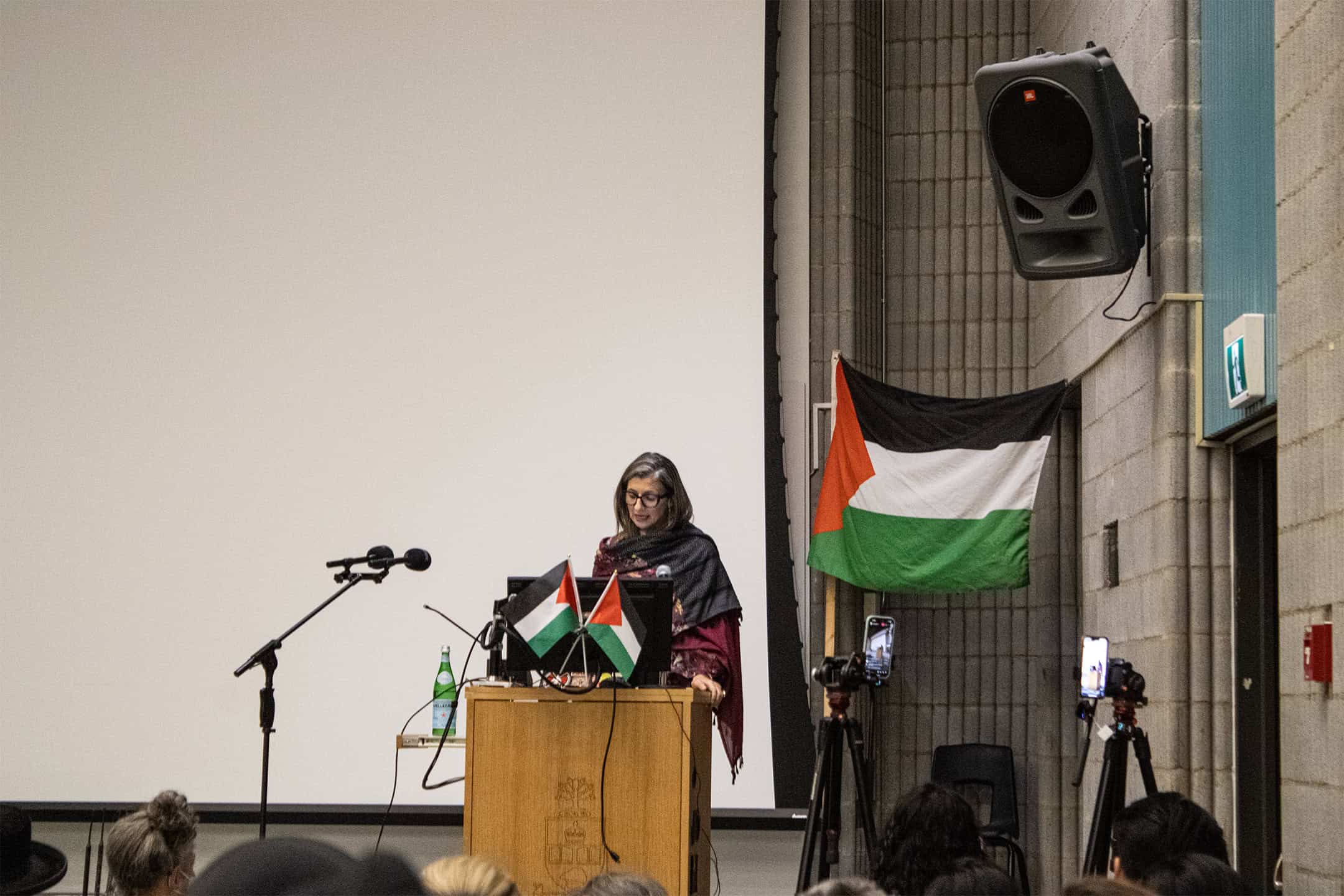Content warning: This article discusses genocide and antisemitism.
On November 7, Francesca Albanese — the United Nations (UN) Special Rapporteur on the Situation of Human Rights in the Palestinian Territories occupied since 1967 — addressed a packed 500-seat auditorium at the Medical Sciences Building. The event, organized by Tkarón:to Students in Solidarity with Palestine (TSSP) and various other groups, focused on her latest October report, “Genocide as colonial erasure.”
Since Hamas’ attack on Israel on October 7, 2023, which killed around 1,200 Israelis, the Israeli military’s response has killed over 44,000 Palestinians.
In July, the International Court of Justice (ICJ) issued an advisory opinion declaring Israel’s occupation of Palestinian territories illegal, and in January, it called on Israel to take all necessary measures to prevent acts of genocide against Palestinians.
Despite this, Israel has continued its military actions in Gaza and escalated attacks against the Lebanese political party and militant group Hezbollah, killing over 700 people in Lebanon in September.
On November 22, the International Criminal Court issued arrest warrants for Israeli Prime Minister Benjamin Netanyahu, Israel’s former Defence Minister Yoav Gallant, and a senior Hamas official for alleged war crimes committed in Gaza.
“Obligations under international law”
Before her appointment as Special Rapporteur in May 2022, Albanese spent over a decade advising the UN, governments, and civil society on human rights law as an international lawyer and academic.
The UN Special Rapporteur on the occupied Palestinian territories is an independent expert appointed by the UN Human Rights Council to investigate Israel’s international law violations.
As Special Rapporteur, Albanese has authored five major reports addressing Palestinians’ self-determination, deprivation of liberty, violated childhood, genocide, and displacement through settler colonialism. Her talk at U of T focused on findings from her most recent reports.
Albanese began her remarks with a land acknowledgement, recognizing the “victims of all genocides, past and present.”
Her speech focused on land, settler colonialism, and genocide in international law. In her March report, “Anatomy of a Genocide,” she identified three reasonable grounds to believe Israel committed genocide against Palestinians: killing members of the group, causing serious bodily or mental harm to members of the group, and deliberately inflicting conditions of life intended to bring about the group’s physical destruction in whole or in part.
Later, Albanese highlighted the importance of establishing Israel’s actions as genocide rather than as another crime against humanity. Despite the latter being easier to prove, she noted that, “Genocide [is] characteristic [of Israel’s actions] because [it] hinges upon the determination to destroy a people,” Albanese responded. “I don’t think we should give in because of strategic considerations. In my view, this would betray what is happening to the people.”
In her latest report, Albanese emphasized genocidal intent as the key distinction from other crimes against humanity, arguing that “control of the land… [is] central to understand[ing] the intent that drives Israel’s genocide.”
She encouraged the audience to “step outside [their] Western understanding of land,” emphasizing that Israel seeks to acquire the land while Palestinians find the land “integral to their existence” — as any Indigenous people do.
Albanese described the destruction in the occupied Palestinian territories as “what… settler colonial genocide looks like.” Settler colonialism involves a group taking control of land by displacing the Indigenous population and replacing it with settlers.
Citing the ICJ’s opinion, Albanese explained that the court’s member states, including Canada, have “clear obligations under international law toward the Palestinian people” that she argued are not being upheld.
Albanese recommended that Canada align with ICJ provisional measures by reviewing and suspending its free trade agreement with Israel, prohibiting Canadian citizens from serving in the Israeli military, and holding accountable any Canadians and companies selling Palestinian land in the occupied West Bank.
Criticism and support
Since her appointment as rapporteur, Albanese has garnered significant international attention, with critics accusing her of antisemitic and anti-Israel bias before taking on the role. During her tour of North American universities, several individuals and organizations attempted to shut down her talks.
Hillel Ontario called on U of T to “[Stop] platform[ing] speakers under the guise of academic freedom,” referring to Albanese as one of those who “perpetuate dangerous antisemitic hate and terrorist propaganda.”
Registered attendees received an email before the event about the venue location and instructions to “conceal any keffiyehs, flags, and other symbols of Palestine solidarity” inside the venue to “avoid potential disruptions or safety concerns.”
In a statement to The Varsity, Sara Rasikh, an Occupy for Palestine (O4P) spokesperson and second-year masters student studying social justice education, noted that five counter-protesters were present, with two sitting by the doors during the event. Rasikh claimed that the counter-protesters were associated with the Jewish Defence League (JDL), a recognized right-wing terrorist group in the US.
However, The Varsity was unable to independently verify the number of counter-protesters present and their affiliation with the JDL.
A day before the event, 30 Jewish organizations issued a statement in support of Albanese, denouncing the “toxic smear campaigns to silence her and to harm her human rights mandate.” They rejected the antisemitism allegations as “unfounded and recklessly incite[d]” and condemned the weaponization of antisemitism, particularly through the International Holocaust Remembrance Alliance definition.
Q&A highlights
The second half of the event featured a Q&A session moderated by Chandni Desai — an assistant professor in critical studies of equity and solidarity — and Dania Majid — the co-founder and president of the Arab Canadian Lawyers Association.
During the event, a few audience members asked about the UN’s role in identifying and preventing genocide.
“We should neither overestimate nor romanticize the United Nations,” Albanese said, emphasizing that member states have the responsibility to respect international law and prevent genocide.
“Palestine today is a test for international law,” she said. “Clearly… there has been a failure of upholding legal principles […] It has taken nine months to pass the resolution ordering a ceasefire, and when it was passed, it has not been applied.”

Upon being asked why she condemned the October 7 Hamas attacks, which some in the audience characterized as “the right of the Palestinian people to armed resistance,” Albanese acknowledged the frustration that some may feel about this rhetoric but emphasized that every civilian has a right to life.
She clarified, however, that condemning violence against civilians does not negate the right to resist occupation. “[That right] exists under international law, and it exists for Palestinian people… as recognized by the General Assembly.”
Albanese concluded her remarks by praising the youth in attendance for their activism, many of whom were affiliated with TSSP and O4P, the latter of which organized the encampment at King’s College Circle.
“We cannot allow the live-streamed genocide and its associated apathy to desensitize us to the violence, normalize the oppression, and dissociate us from its moral failure, legitimizing the legitimate,” said Albanese. “Humanism is the only, and I would go as far as saying, the final resistance we have against the inhuman practices and injustices that disfigure human history.”



No comments to display.